Native Instruments Kontakt Player: many wonder why there are so few free and commercial releases, the answer is simple!
Plugins and Kontakt libraries have something in common. There are tons of them, from small, fascinating sound designers to big players. There are two versions of NI’s flagship soft sampler: Kontakt, the full version, and the Player. Both are currently in the seventh version but differ significantly.
With the regular Kontakt sampler, you can design custom instruments, play third-party libraries, etc. Native Instruments Kontakt Player, however, is just a stripped-down version and a player for licensed libraries. Easily explained. Again and again, questions come from the community, especially from the free plugin community, about why there are so few Kontakt Player libraries available.
The answer is relatively simple, but you have to know the background details that Native Instruments like to hide from the public. But don’t worry, I will give you some details.
Kontakt Player
Almost everyone has downloaded an exciting Kontakt Library and then, unfortunately, noticed that it cannot be played in the Kontakt Player or that it only lasts 15 minutes as a demo. This is because KP libraries require a Native Access 1/2 enabled license which costs the developer money. It doesn’t matter whether it’s a free or a commercial library, both require them and cost a lot to the developer. The same applies to Reaktor Player libraries.
High Price For A 100% Free or Commercial Instrument
Two scenarios: if a developer wants to release a free or commercial Kontakt Player instrument, they must contact the NI team and pay a one-off encoding fee of $1000 for each library. According to Native Instruments, this covers the development services for encoding, plus QA and integration into the NI ecosystem. Ouch, that’s a lot of money, especially for small developers.
Then the developer has to decide how many licenses he wants to generate for his library. This process is not free. The price differs here from a free to a commercial library.
For a FREE, aka promotional release, the developer has to pay 2500€/$2500 USD and get in exchange 25000 NFR serial numbers. If the library attracts more people, you can buy another batch for the same price. I think you can already see at this point why the market for free Kontakt Player is soo tiny. With 3000€/$3000 USD, it is simply too expensive for most indie developers.
For commercial third-party libraries, the price depends on the number of licenses and the price the developer asks for. The more licenses, the more interesting the price becomes. A big investment for indie developers. In these packages, some NFR versions are also free to promote the product.
I’m a big fan of synth libraries from small developers that you can find at Loot Audio, for example. Many of the libraries are priced affordably between 10€ and 50€. If the developer wants to publish a Kontakt Player-enabled synth instrument for €49 and is optimistic and estimates selling 300 licenses, the price will be 2176€ or more in detail:
3,92 per license x 300 = 1176€ + 1000€ one-off-encoding fee = 2176€
So an indie developer like Rigid Audio, Nova, or Synth Magic would have to put 2000€+ on the table before releasing their instrument for Kontakt Player. That’s a lot of money. And if you want to sell the library more expensive because it is more complex, it will be even more expensive.
Licensing + Money
Licensing and money are the only reasons there are so few free downloadable Kontakt Player libraries. The same applies to low/mid-priced commercial releases. A lot of it is because the market of potential buyers is smaller than that of regular audio plugins. So many developers are not ready to make this investment before the release. Especially when they don’t know how many musicians buy the virtual instrument.
I think it’s a shame that many of the fantastic indie libraries you can buy for little money never will reach the big community. With this policy system, these will only ever be available to a small exclusive group of musicians using the full version of Kontakt.
On the other hand, I can understand the policy that Native Instruments calls here. They provide a licensing platform, check the library for problems, encode it, etc. It’s work done by developers who want to get paid at the end of the month. And is a legitime business model that has worked for many years.
But there has also been a change in the last two years. Many developers have turned their backs on the Player platform. For example, Sample Logic converted many previously Player-enabled high-quality instruments to Kontakt full. Or Spitfire simply developed its own sample playback plugin. With such license fees, it is worth developing a plugin. I can understand that.
Kontakt Synths
Now you know why developers almost only release virtual instruments for the full version of Kontakt. It’s not the plugin, it’s the money.
To round it off, here are some synth Kontakt libraries that I tested a long time ago. Of course, for Kontakt full. It would be nice if everyone could play them, but unfortunately, that’s just a dream.
Native Instruments Kontakt Player is free, and Kontakt 7 is available now for 299€/$299 USD. And if you’re looking for new Kontakt stuff for the Player or Full, NI is having a big 60% OFF sale on Heavyocity products right now.
More information here: Native Instruments

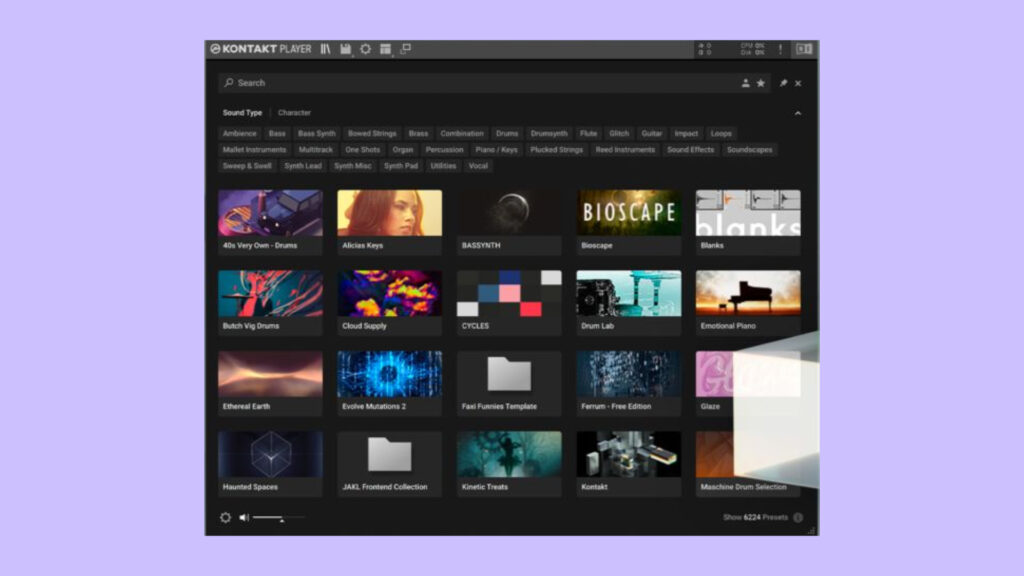
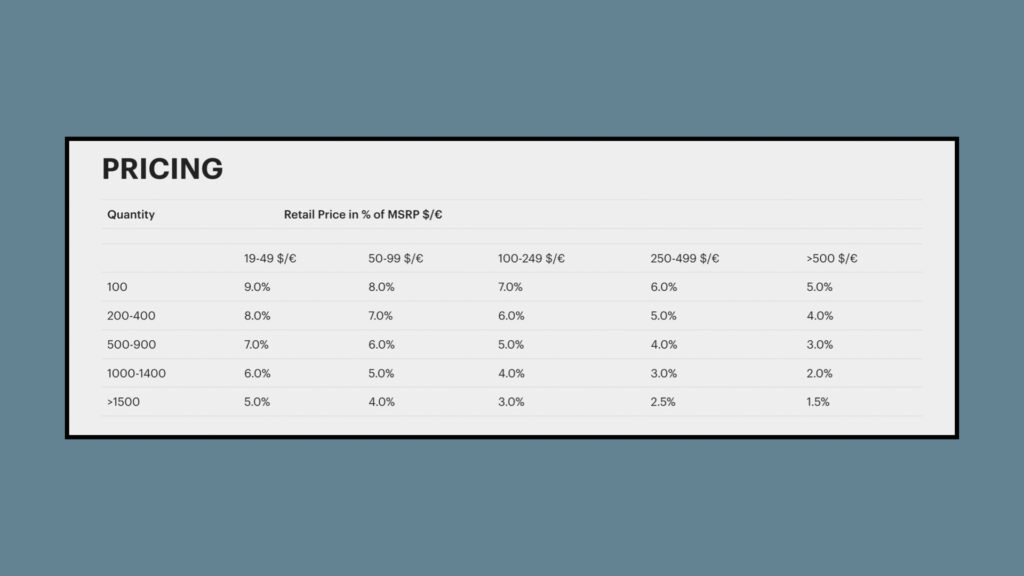
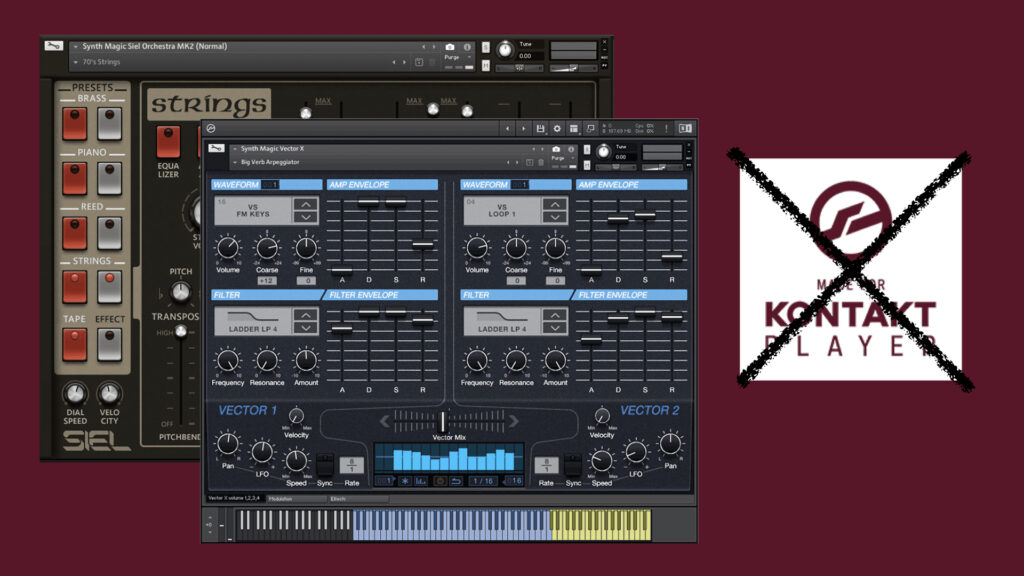
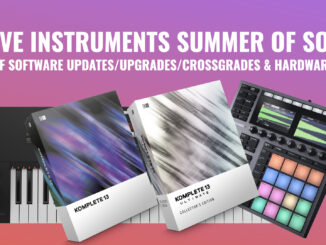
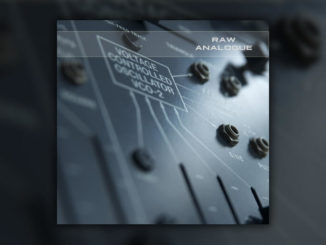
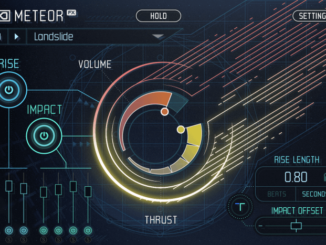
“The same applies to Reaktor Player libraries.”
Really? That’s quite surprising given the large number of free ensembles coming out in the Reaktor User Library.
https://www.native-instruments.com/en/reaktor-community/reaktor-user-library/
(I do own a license to the full Reaktor. I’ve tested some free ensembles in RP and they worked well.)
Even if we can understand where NI’s practice is coming from, it’s resulting in an impoverishment of our scene and will eventually affect Soundwide negatively as their relevance is decreasing rapidly. Decent Sampler is improving faster than Kontakt and Old School sample libraries are now in a much wider ecosystem.
Because you have a full Reaktor license enabling you to load Reaktor ensembles from the User library. Reaktor Player user, however, can’t load these libraries as they need to be encoded like the Kontakt Player libraries. Plus, the developer need to join the license policy where they need to pay for licenses, etc.
Wow. That’s really messed up. Thanks for the clarification!
This is hilarious. I just hope that Soundpaint gains more popularity. The sampler engine is completely free (as in free beer) and is as capable as Kontakt, if not superior. Definitely superior to Decent Sampler. Their license allows free distribution of instruments for non commercial purposes. Go check it out. The included 1928 Steinway is the best sampled piano I know. I‘m not related to them, just a happy user.
https://soundpaint.com
It doesn’t have an open scripting language like Kontakt though, and as you said yourself, is only free for “non-commercial” use, so it is not interesting to me as a small indie developer. I was invited to contribute libraries to it before release, but declined for those and a number of other reasons.
Fair points.
One of the main advantages of the Soundpaint approach is in the way it implements legato. It’s nice that Toels makes that engine available to others, yet it’d be difficult to build a business model on that engine.
What might work, though, is if people find ways to create and distribute libraries through diverse engines. Hise would be part of that story.
Ah okay, got it. I‘ve seen it from the perspective of a musician who would like to exchange instruments. But for indie developers it‘s not possible to use it. If they would only offer an attractive licensing model for you guys…
In all honesty, I want to thank you for this thoughtful reply. I feel we need more of this in our online conversations.
And, indeed, attractive licensing for indie devs would likely help our scene overall. Probably more than approaches focused on copy-protection measures.
Pretty sure NI’s Sounds.com wouldn’t help. Or Samplephonics (Noiiz), Beatport (Loopcloud), Output (Arcade)… Maybe Splice could get there.
Of course, Apple’s EXS format is nothing to sneeze at… except for the fact that it’s specific to Logic/Mainstage.
As for dS, I’m curious to learn more about what you find which is so obviously missing. I recently discovered how quickly the project is improving and found some of its features (like true legato) really cool in implementation. Plus, as a non-developer, I find it remarkably easy to use to create libraries. And it’s available on iPadOS.
Besides, it sounds like it does have a good “licensing” story: sample libraries can be distributed and/or sold without requiring any license fee. Non-exclusive promotion on their store just means that they take a commission.
https://www.decentsamples.com/qa/27/what-license-is-decent-sampler-under?show=27#q27
I‘m using samplers but I’m not sampling myself. While flagship samplers like Kontakt and Soundpaint have tons of features: envelopes, modulators, filters, sample morphing, etc. I can’t even find a page about decent Sampler‘s features. When I look at it, it seems to be very basic with only a few controls usually for effects. With Soundpaint I can easily use existing programs and create my on sound with them, shaping the sound of existing presets. You are saying dS has developed a lot and I’ve heard this opinion quite often so probably I can’t recognize the value that dS offers but me it looks like a preset player where I have no creative options at all.
Going back to this whole thing about NI’s licenses (and experiencing issues with installing Steinberg’s HALion Sonic 7).
There used to be a time when the sale, distribution, installation, authentication, validation, and maintenance of copy-protected software and content required large investments by developers themselves. In our scene, PACE got quite a bit of traction, for a while. Partly with physical dongles. At the time, NI’s approach might have been relevant.
Nowadays, while it’s easy to criticize app and game stores with the cuts they take, there’s a whole lot to be said about the convenience and usefulness of new mechanisms to handle all of these things.
For sample libraries, specifically, we’re ready for “disruption” (in the sense of Clay Christensen’s Innovator’s Dilemma).
Wondering if NI would consider a rent to buy option for kontakt 7, I think they are offering subscriptions for some products now just not kontakt. Anyways Soundpaint and decent sampler as well as labs are all samplers I use currently.
I don’t think that makes much sense as NI makes a lot of sales. It always better to buy them in sales where you can get the stuff for the best price. you can get currently Kontakt 7 für 149,50€ which is an excellent price for such a sampler beast and third-party library community.